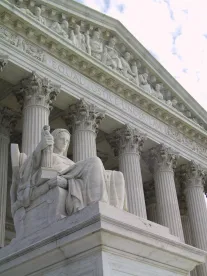On June 13, 2022, the Supreme Court issued its highly anticipated decision on the issue of whether 28 U.S.C. § 1782 permits district courts to order discovery for use in international commercial arbitration or ad hoc investment arbitration. See ZF Automotive, Inc. v. Luxshare, Ltd., 142 S.Ct. 2078 (2022). In a unanimous opinion authored by Justice Amy Coney Barrett, the Court held that section 1782 does not authorize discovery for use in those two forms of international arbitration because only a governmental or intergovernmental adjudicative body qualifies as a “foreign or international tribunal.”
The decision resolved two cases, one from the Second Circuit Court of Appeals and the other from the Sixth Circuit. The Sixth Circuit case, ZF Automotive v. Luxshare, Ltd., involved a private commercial arbitration conducted under the rules of the German Institution of Arbitration e.V. (“DIS”), which is a private dispute-resolution organization based in Berlin. In that case, Luxshare, a Hong Kong-based company, sought discovery from defendant ZF Automotive U.S. Inc., a Michigan-based automotive parts manufacturer and subsidiary of a German corporation, for use in a DIS arbitration. Luxshare filed an application under § 1782 in the United States District Court for the Eastern District of Michigan. The district court granted the request, and ZF moved to quash, arguing that the DIS arbitration tribunal was not a “foreign or international tribunal” under § 1782. The district court denied the motion to quash and the Sixth Circuit denied a stay.
In AlixPartners LLP v. Fund of Protection of Investor’s Rights in Foreign States, the underlying dispute arose from a failed Lithuanian bank that declared insolvency and was nationalized by Lithuanian authorities. The Fund initiated ad hoc arbitration against Lithuania under the Lithuania-Russia bilateral investment treaty. The bilateral investment treaty provided four options for dispute resolution: (1) a competent court or court of arbitration of the Contracting Party in which territory the investments are made; (2) the Arbitration Institute of the Stockholm Chamber of Commerce; (3) the Court of Arbitration of the International Chamber of Commerce; and (4) ad hoc arbitration in accordance with Arbitration Rules of the United Nations Commission on International Trade Law (UNCITRAL). The Fund chose the fourth option for arbitration and sought discovery under § 1782 from AlixPartners in the Southern District of New York. AlixPartners had acted as administrator of the allegedly expropriated Lithuanian bank. AlixPartners resisted discovery, arguing that the ad hoc arbitration panel was not a “foreign or international tribunal” under § 1782. The district court rejected that argument and granted the Fund’s request for discovery. The Second Circuit affirmed.
-
Section 1782(a) provides:
-
“The district court of the district in which a person resides or is found may order him to give his testimony or statement or to produce a document or other thing for use in a proceeding in a foreign or international tribunal, including criminal investigations conducted before formal accusation.”
-
The Supreme Court in ZF Automotive found that the word “tribunal” must be considered as part of the phrase “foreign or international tribunal,” and that the modifiers provide that § 1782 applies only to an “adjudicative body that exercises governmental authority.” 142 S.Ct. at 2086. The Court stated that the word “tribunal” is a word with potential governmental or sovereign connotations, so “foreign tribunal” more naturally refers to a tribunal belonging to a foreign nation than to a tribunal that is simply located in a foreign nation. For a tribunal to belong to a foreign nation, the Court stated that “the tribunal must possess sovereign authority conferred by that nation.” Id. at 2087. And with respect to “international,” the Court held that a tribunal is “international” when two or more nations, have imbued the tribunal with official power to adjudicate disputes. Id.
The Court also relied on the statutory history to conclude that § 1782 does not apply to private arbitration. The Court found that the amendment of § 1782 in 1964 did not signal an expansion from public to private bodies, but rather an expansion of the types of public bodies covered. “By broadening the range of governmental and intergovernmental bodies included in § 1782, congress increased the ‘assistance and cooperation’ rendered by the United States to those nations.” Id. at 2088. Considering the federal law on arbitration, the Federal Arbitration Act (“FAA”), the Court also noted the “notable mismatch between foreign and domestic arbitration” if § 1782 is to reach private arbitration because “prearbitration discovery is off the table under the FAA” in domestic arbitration. Id.
Turning to the question whether the adjudicative bodies in the two cases before the Court qualified as governmental or intergovernmental bodies, the Court rejected both. The arbitral tribunal in ZF Automotive was a private tribunal that drew its authority from a contract between private parties, and therefore did not exercise governmental authority. The ad hoc investment arbitration in the Fund’s dispute with Lithuania raised more difficult issues because the arbitration involved a sovereign state as a party and the agreement to arbitrate arose from an international treaty rather than a private contract. The Court questioned whether the two nations, Russia and Lithuania, intended to confer governmental authority on an ad hoc panel formed pursuant to the treaty to resolve a dispute between a private investor and one of the governments. Finding that the ad hoc panel is “materially indistinguishable in form and function” from the DIS panel presiding over the dispute between ZF and Luxshare, the Court held that the ad hoc panel derives its authority in the same way as the panel in a private arbitration. The Court further noted that the presence of a treaty does not automatically render ad hoc arbitration governmental. Instead, it offers investors the option to resolve their disputes in a private arbitration that operates like private commercial arbitration.
Notably, the Court did not foreclose the possibility that sovereigns might “imbue an ad hoc arbitration panel with official authority.” 142 S. Ct. at 2090. The relevant question is “whether the nations intended that the ad hoc panel exercise governmental authority.” Id. at 2091. The question whether an arbitration tribunal constituted under the authority of the International Centre for Settlement of Investment Disputes (“ICSID”), which in turn derives its authority from the Convention on the Settlement of Investment Disputes between States and Nationals of Other States (“ICSID Convention”) qualifies as a panel with governmental authority remains open. It also seems possible, at least in theory, that a commercial arbitration tribunal in a country that regulates which arbitral tribunals (or arbitral institutions) have authority to adjudicate disputes might exercise governmental authority. Again, the inquiry under ZF Automotive is not whether an adjudicative body shares some features of other bodies that are governmental, or even whether tribunal was authorized by a treaty, but rather “whether those features and other evidence establish the intent of the relevant nations to imbue the body in question with governmental authority.” Id. at *10.
It is inevitable that parties will continue to litigate the questions left unanswered by the Court in ZF Automotive, most likely whether different types of treaty-based arbitral tribunals qualify as “foreign or international tribunals.” It is also foreseeable that private parties faced with a choice of dispute resolution mechanisms under a bilateral investment treaty or free trade agreement will opt for mechanisms that they believe are more likely to be viewed as “imbued with governmental authority” if they anticipate the need to seek discovery from parties in the United States.
The Supreme Court’s decision will no doubt limit the volume of § 1782 applications in district courts since it foreclosed any discovery sought from parties engaged in private commercial arbitration. The decision also resolves a circuit split that may have encouraged parties to forum shop in the past. Following ZF Automotive, on June 22, 2022, the Third Circuit Court of Appeals affirmed a district court’s order denying discovery pursuant to section 1782 for use in a private arbitration proceeding under the rules of the DIS. See In re: Application of EWE Gasspeicher GmbH, No. 20-1830, 2022 WL 2233915 (3rd Cir. 2022). Although ZF Automotive will undoubtedly make section 1782 applications less attractive in many cases, the Court left enough leeway for clever advocates to shape (or describe) dispute resolution proceedings in ways that satisfy the new “imbued with governmental authority” standard.




 />i
/>i

